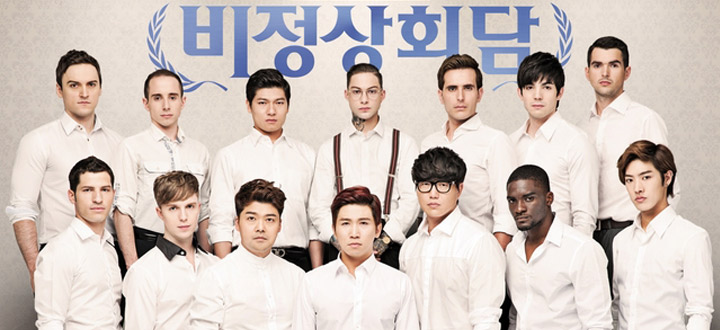A comical simulation of the Group-of-20 (G-20) summit, JTBC program Non-Summit quickly garnered popularity after it debut July 7. With representatives from 11 nations: Canada, US, France, Belgium, Ghana, China, Japan, Italy, Australia, Turkey and Germany, Non-Summit members attempt to introduce their respective cultures as accurately as possible. As foreigners who are highly proficient in Korean and unique in their own ways, the representatives add to the entertaining and educational aspects of the program, also known as Bijeongsanghoedam in Korean.
Non-Summit includes two “chair members,” former KBS announcer Hyun-Moo Jun and ballad singer Si-Kyung Sung, as well as one “Secretary General”, comedian Sae-Yoon Yoo. Under their leadership, the “delegates” from 11 nations gather to discuss an issue that a Korean guest brings to the table each week. The topics range from the harms and benefits of social networking sites to reasons for high unemployment rates in Korea. Through their discussions and voting procedures, delegates help viewers understand diver cultural perspectives.
“Non-Summit is very unique because every time I watch the show, I gain new perspectives on the world,” said Tyra Kim (11), fan of Non-Summit. “I can tell the hosts truly love Korean culture and respect it, because they [seem to] have endless ambitions to learn more about Korean and the culture. My favorite delegate is Julian Quintart, [representative of Belgium], because he is able to strongly assert his opinions regarding issues without question even if his beliefs may not be in complete accordance with Korean culture.”
Each conference session begins by discussing a timely event. As the Asian Games is currently taking place in Korea, one of the more recent episodes featured the delegates sharing the cheer for each respective nation and showing off the sports they are strong in. After their introductions, a Korean guest would emerge to discuss if a behavior is considered unusual in the delegates’ cultures. Regarding the abnormality of the behavior, the delegates usually undergo a set of three voting procedures, one before, one during and one after the conference. That way, the users can see the change in perspectives throughout the discussion.
These discussions also enable each delegate to develop his or her own persona. For instance, US representative Tyler Rasch, a University of Chicago graduate who is pursuing higher education at Seoul National University, is known to be the “nerd” because he is able to point out the crux of each debate and explain the meanings of more advanced Korean words. On the other hand, Enes Kaya, representative of Turkey, is known to be the conservative who sharply opposes anything that is considered liberal.
“I feel like Non-Summit helps reconcile differences that exist among cultures, however comical the show may be,” Sooah Kang (11) said. “Representatives of countries that would typically be uncomfortable around each other are now good friends—Zhang Yuan and Takuya used to be very tense as representatives of China and Japan, but they now jokingly acknowledge each other’s accomplishments. In fact, when Japanese swimmer Kosuke Hagino won the gold medal during the Asian Games, Zhang Yuan tweeted Takyua a word of congratulations. I hope this bond is also shown through the other gatherings like the United Nations.”

